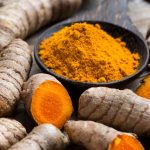Turmeric, an age-old spice known for its vibrant yellow color and warm, bitter taste, has been a staple in traditional medicine for centuries, particularly in Ayurvedic and Chinese medicine. In recent years, this golden wonder has gained attention in the Western world for its culinary uses and potential health benefits. This comprehensive article examines whether turmeric could be a suitable option for managing Inflammatory Bowel Disease (IBD) and alleviating headaches or migraines.
Turmeric comes from the root of the Curcuma longa plant, and its primary active component, curcumin, has been the focus of numerous scientific studies. Curcumin is renowned for its anti-inflammatory, antioxidant, and potentially therapeutic properties, which could contribute to its effectiveness in treating various medical conditions.
Turmeric and Inflammatory Bowel Disease (IBD)
Inflammatory Bowel Disease (IBD) encompasses two significant disorders: Crohn's Disease and Ulcerative Colitis. Both conditions involve chronic gastrointestinal (GI) inflammation, leading to symptoms such as severe diarrhea, pain, fatigue, and weight loss. Managing IBD often requires a combination of medication, diet, and sometimes surgery. This is where turmeric might offer a natural alternative or adjunctive therapy.
Anti-inflammatory Properties
Curcumin, the active ingredient in turmeric, is well-documented for its anti-inflammatory effects. These properties are particularly relevant for IBD, where inflammation of the GI tract lining is a primary issue. Research suggests that curcumin can inhibit the activity of pro-inflammatory enzymes and cytokines, which are key players in the inflammatory processes of IBD. By reducing inflammation, turmeric may help alleviate symptoms and improve the overall quality of life for individuals with IBD.
A double-blind, placebo-controlled study found that people with Ulcerative Colitis who took curcumin along with their conventional treatment experienced a significantly lower relapse rate compared to those who took a placebo. This indicates that turmeric could effectively maintain remission in Ulcerative Colitis patients.
Gut Health Benefits
Turmeric also shows promise in promoting gut health, which is essential for managing IBD. Curcumin's antioxidant properties help protect the intestinal lining cells from damage by free radicals. Furthermore, curcumin may enhance the production of certain protective enzymes in the gut, which can improve the barrier function of the intestinal wall and reduce permeability. This is particularly important, as a compromised intestinal barrier is often observed in IBD patients, leading to a “leaky gut” and exacerbated symptoms.
Clinical Trials and Studies
Several studies support turmeric's potential benefits for IBD. For instance, a study published in the journal Clinical Gastroenterology and Hepatology reported that a curcumin supplement significantly improved disease activity in patients with mild-to-moderate Ulcerative Colitis. Similarly, another study highlighted curcumin's potential to reduce the need for steroids and other anti-inflammatory drugs in IBD management, providing a safer long-term option with fewer side effects.
However, while these studies are promising, more extensive clinical trials are required to fully establish turmeric's efficacy and optimal dosing for IBD treatment. Patients should consult their healthcare provider before starting any new treatment regimen, including turmeric supplements.
Turmeric and Headaches or Migraines
Headaches and migraines can be debilitating, affecting millions of people worldwide. Migraines, in particular, are severe headaches often accompanied by nausea, vomiting, and sensitivity to light or sound. While various treatments exist, including medications and lifestyle changes, turmeric's natural properties might offer additional relief.
Anti-inflammatory Effects
One of the primary causes of migraines is believed to be inflammation of the blood vessels in the brain. Given curcumin's potent anti-inflammatory properties, turmeric could help mitigate this inflammation and relieve migraine symptoms. Curcumin inhibits the activity of nuclear factor kappa-light-chain-enhancer of activated B cells (NF-kB) and tumor necrosis factor-alpha (TNF-alpha), both of which play roles in the inflammatory pathways associated with migraines.
Antioxidant Benefits
Oxidative stress is another factor that contributes to the development and severity of migraines. Curcumin's antioxidant properties help neutralize free radicals in the body, potentially reducing the oxidative stress that can trigger or worsen migraines. By protecting brain cells from oxidative damage, turmeric may help prevent the onset of migraine attacks or decrease their frequency and intensity.
Pain Relief
Turmeric has also been noted for its pain-relieving properties, which can be particularly beneficial for those suffering from chronic headaches and migraines. A study published in the Journal of Pain Research found that curcumin could significantly reduce pain scores in individuals with chronic pain conditions. These analgesic effects are believed to result from curcumin's ability to modulate pain pathways and reduce inflammation.
Supporting Research
While direct research on turmeric's effects on migraines is still emerging, initial studies and anecdotal evidence show promise. For example, a pilot study published in the journal Phytotherapy Research suggested that a combination of curcumin and coenzyme Q10 significantly reduced the duration and frequency of migraines in a small group of participants. This finding highlights the potential of curcumin as part of a broader strategy for migraine management.
It's worth noting that individual responses to turmeric may vary, and combining it with other treatments may be necessary for optimal results. Individuals should always consult with their healthcare provider before adding turmeric to their treatment regimen, especially if they already take medications.
How to Incorporate Turmeric
Turmeric can be incorporated into the diet or taken as a supplement to reap the potential benefits of IBD, headaches, or migraines. Here are some practical ways to include turmeric:
Dietary Inclusion
Turmeric can be added to various dishes, such as curries, soups, and smoothies. Its warm, earthy flavor complements many recipes, making it a versatile ingredient in the kitchen. Combining turmeric with black pepper enhances curcumin absorption due to piperine, a compound in black pepper that increases bioavailability.
Supplements
For those who prefer a more concentrated dose, turmeric supplements are widely available in various forms, including capsules, extracts, and tinctures. Choosing high-quality supplements from reputable sources is essential to ensure purity and efficacy. Some supplements combine turmeric with other ingredients like bromelain to enhance absorption and anti-inflammatory effects.
Dosage and Precautions
The optimal dosage of turmeric can vary depending on the condition being treated and individual factors. Studies commonly use doses ranging from 500 mg to 2 grams of curcumin per day for IBD. For headaches and migraines, doses of around 400 mg to 600 mg taken two to three times daily have been suggested. Nevertheless, it's crucial to consult a healthcare provider to determine the appropriate dosage and avoid potential interactions with other medications.
While turmeric is generally considered safe, it can cause side effects in some individuals, particularly when taken in large amounts. Possible side effects include gastrointestinal discomfort, nausea, and increased risk of bleeding due to its blood-thinning properties. Pregnant women, individuals with gallbladder disease, and those on blood-thinning medications should exercise caution and seek medical advice before using turmeric supplements.
Conclusion
With its potent anti-inflammatory and antioxidant properties, turmeric holds promise as a natural option for managing Inflammatory Bowel Disease and alleviating headaches or migraines. While studies suggest potential benefits, further research is needed to establish definitive guidelines and confirm its efficacy for these conditions. By incorporating turmeric into their treatment plans, individuals may find relief from symptoms and improve their overall well-being.
Consulting with healthcare providers before starting any new treatment is essential, especially for those with existing medical conditions or taking other medications. With its rich history in traditional medicine and growing scientific evidence, turmeric remains a golden answer to many health challenges.
For further reading on the benefits and risks of turmeric, you can visit Mount Sinai's Health Library and Medical News Today.










